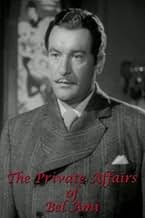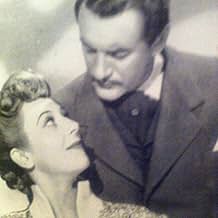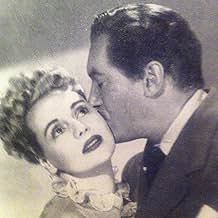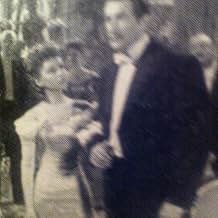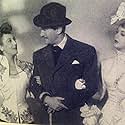CALIFICACIÓN DE IMDb
6.7/10
881
TU CALIFICACIÓN
Agrega una trama en tu idiomaIn 1880, in Paris, chance brought together two former comrades-in-arms - Charles Forestier, who had become a journalist for "La Vie française" - and Georges Duroy, idle since leaving the six... Leer todoIn 1880, in Paris, chance brought together two former comrades-in-arms - Charles Forestier, who had become a journalist for "La Vie française" - and Georges Duroy, idle since leaving the sixth regiment of hussars.In 1880, in Paris, chance brought together two former comrades-in-arms - Charles Forestier, who had become a journalist for "La Vie française" - and Georges Duroy, idle since leaving the sixth regiment of hussars.
- Dirección
- Guionistas
- Elenco
Susan Douglas Rubes
- Suzanne Walter
- (as Susan Douglas)
- Dirección
- Guionistas
- Todo el elenco y el equipo
- Producción, taquilla y más en IMDbPro
Opiniones destacadas
The Private Affairs of Bel Ami gave George Sanders to play a leading role as Guy de Maupassant's gentleman cad who rises in Parisian society over the bodies of a number of seduced and abandoned women. Sanders is a former dragoon who uses his charm to acquire money and power and in the end a title of minor nobility in Third Republic France. The one woman whom he truly loves, Angela Lansbury, is forever lost to him. Would she have brought him real happiness? It's for the audience to judge.
The comparisons between Bel Ami and Sanders's Oscar winning Addison DeWitt have to be made. Both men are cynics about human nature, but whereas theater critic DeWitt is an observer and a behind the scenes manipulator of others, Bel Ami is doing it all for his own advancement. Both performances have that touch of cad about them and they rank as some of the best work George Sanders did.
Look for good performances from John Carradine as Sanders's only true male friend and Angela Lansbury who he loves, but who can't give him the social standing he needs.
Also of course look for Warren William in his farewell role as Sanders's main antagonist. A not very brave, but a fairly shrewd sort, Sanders regularly bests him until the very end.
The Private Affairs of Bel Ami was a rather daring film for Code run Hollywood, it doesn't surprise me it was an independent movie, released by United Artists.
Fans of The Eternal Cad George Sanders will eat it up.
The comparisons between Bel Ami and Sanders's Oscar winning Addison DeWitt have to be made. Both men are cynics about human nature, but whereas theater critic DeWitt is an observer and a behind the scenes manipulator of others, Bel Ami is doing it all for his own advancement. Both performances have that touch of cad about them and they rank as some of the best work George Sanders did.
Look for good performances from John Carradine as Sanders's only true male friend and Angela Lansbury who he loves, but who can't give him the social standing he needs.
Also of course look for Warren William in his farewell role as Sanders's main antagonist. A not very brave, but a fairly shrewd sort, Sanders regularly bests him until the very end.
The Private Affairs of Bel Ami was a rather daring film for Code run Hollywood, it doesn't surprise me it was an independent movie, released by United Artists.
Fans of The Eternal Cad George Sanders will eat it up.
The movie is is faithful to the novel for about 3/4 of its running time. A handsome, amoral rake cuts his way through the vain, naive, foppish,self centered denizens of Parisian society in the 1880s He is not that smart, but he is shrewd enough to get the money and affection he craves. We don't know where his appetites came from. De Maupassant created him primarily to show the appalling psychological weaknesses of French upper class society "Prety Boy", as he is called, wins and wins big.
Well, the morals code of 1947 would not permit this. A scoundrel thriving is as bad was a naked woman on screen in the 1940s. You couldn't show it! Thus, the entire last section of this movie is made to comply with the code, and it plays out a story of how "Pretty Boy"'s primary victim thwarts his schemes and gets even. She gets even Big.
While I am happy to see the rat get his, this ending undermines the main point of the novel. It also doesn't fit the first three quarters. Characters suddenly behave differently than they did previously with no description of how and why they changed.
Still, it is a literate and intelligent movie. Not many of this kind of movie was made then, and even fewer are made today It is well played. George Sanders is the perfect cad. All the female actors do very well. Even since I first saw Ann Dvorak when I was six or seven, I have had a crush on her all these many decades, so it was good to see her.
Well worth the time for intelligent viewers...and those seniors who love Ann Dvorak!!
Well, the morals code of 1947 would not permit this. A scoundrel thriving is as bad was a naked woman on screen in the 1940s. You couldn't show it! Thus, the entire last section of this movie is made to comply with the code, and it plays out a story of how "Pretty Boy"'s primary victim thwarts his schemes and gets even. She gets even Big.
While I am happy to see the rat get his, this ending undermines the main point of the novel. It also doesn't fit the first three quarters. Characters suddenly behave differently than they did previously with no description of how and why they changed.
Still, it is a literate and intelligent movie. Not many of this kind of movie was made then, and even fewer are made today It is well played. George Sanders is the perfect cad. All the female actors do very well. Even since I first saw Ann Dvorak when I was six or seven, I have had a crush on her all these many decades, so it was good to see her.
Well worth the time for intelligent viewers...and those seniors who love Ann Dvorak!!
Director Lewin started out on his own with a trio of literary adaptations: Somerset Maugham's Moon And Sixpence (1943) was followed by Oscar Wilde's The Picture Of Dorian Gray (1945), and then came this version of Guy de Maupassant's best novel, Bel-Ami, in 1947. George Sanders appeared in all three, giving each a distinct flavour by his presence. A self-obsessed and destructive individual appears in all, increasingly prepared to isolate himself from conscience or morality in order to achieve his goals - at least until an ending brings some comeuppance or resolution. In the first, Sanders plays a Gauguinesque painter, who deserts his family to work in Tahiti. In the second, Dorian Gray pursues his famously immoral activities, Sanders in attendance, whilst Gray's famous painting grows ugly in the attic. In The Private Affairs Of Bel Ami (aka: Women Of Paris, 1947), Sanders returns to centre stage portraying a man climbing to social success over a succession of suffering women.
Scriptwriter-director Lewin brought to each of these films characteristic qualities: literate dialogue, visual excellence, and a representation of interior states through colourful moments of art among them. In the fin de siècle worlds of Dorian Gray and Bel Ami, Lewin sharpens the unease and implicit questioning of mores shown in his earlier Maugham adaptation. Avoiding the temptations of melodrama, he chooses specific historical milieu by which to communicate the ennui of the privileged and the corrupt. Sanders is excellent as George Duroy, the title's charming and unscrupulous social climber, who cannot be trusted with hearts - or come to that, much else: one in the words of the title song who " will be leaving me, (and) who will be deceiving me.." First seen down to his last few francs in 1880's Paris, Duroy's suave looks continually make him irresistible to women have brought him little in the way of fortune. Offered a chance job in journalism by his ex-army friend Forestier (John Carradine), Duroy asks Forestier's independently minded wife Madeline to help with the creation of a first article, while also entering into a relationship with the far more doting Clotilde (Angela Lansbury). Soon the seductive antihero is on his way up the social scale after marrying Madeline (a suggestion he promptly broached in the hapless Forestier's death chamber). Later after engineering a scandal, he divorces this first wife, and acquires a defunct aristocratic title with a view to moving on and up again.
"You're a sneak thief... you take advantage of everyone, you deceive everyone," is the way the disillusioned Clotilde eventually personifies Duroy towards the end of the film, after he callously steals her heart, another man's wife and half her inheritance, then the family name of a missing heir, and finally inveigles the hand of a rich innocent. This single-minded obsession in reaching the top of the social ladder echoes that of the ambitious Horace Vendig in Ulmer's Ruthless, made the following year. Duroy's manipulative, seductive charm brings echoes too of Chaplin's Monsieur Verdoux, also from 1947. But while Duroy's progress does not directly lead to murder, it is more detestable and insidious. Whereas at the close of his film Verdoux offers disingenuous apology for his actions, Bel Ami (although saddled with a ending more in line with the demands of the censor than the original novel) is unrepentant, equating his final misfortunate as being "scratched... by an old cat." There are several elements that make Lewin's film interesting today, being the independent work of a minor, if idiosyncratic auteur, then relatively unusual. Even though the aspirational cad makes use of the women he gets to know, Madeline remains a strong and talented character in her own right. Besides helping Duroy with his writing at the very start, there is a strong suggestion that she has actually been doing much of her first husband's journalism for him too. And despite her final betrayal, she continues to impress as an individually motivated female, in contrast to the ever-loving and forgiving Clotilde. Both are victims but Duroy's emotional abuse and subjugation of them and others is a comment on his own coldness as well as on the liabilities of females in a prejudiced society, made especially keen by the knowledge each woman has of her own predicament. For men, the answer to honour slighted is a duel. Women at best are obliged to fall back on subterfuge or, at worst, live with the grief of a broken heart.
Each of Lewin's first three films was made in black and white. But they also included moments when the screen bursts into startling colour, as the audience contemplates painting central to the theme. The Moon And Sixpence brings a final sequence showing the artist's work, a form of artistic justification for preceding events. In The Portrait Of Dorian Gray, the painting in question reflects back directly the moral dissolution of the subject. Bel Amis' canvas occupies a more complex position in its narrative than its predecessors. It's an expensive work of art, bought by a wealthy patron and admired by Duroy, - one of the few moments in which, half to himself, he evidently expresses an honesty with anything. Painted by Max Ernst (his Temptation Of St Anthony) it reflects back the decadence of its admirers, as well as continuing the plot's subtle thread of damnation.
An excellent cast includes a young Lansbury as Duroy's one true love, and John Carradine as his tuberculosis-ridden journalist friend. Audiences today will be impressed by how modern the feel of it all is, whether in the depiction of Duroy's amoral, manipulative character, completely unfazed at being disliked, or the film's sophisticated and sympathetic treatment of women. Lewin's next work was the weirdly romantic Pandora And The Flying Dutchman (1951), his most ambitious film, the reception of which proved a disappointment. He never rose to such heights again. The Private Affairs Of Bel Ami, is less flamboyant perhaps but just as unforgettable, remaining his most satisfying work.
Scriptwriter-director Lewin brought to each of these films characteristic qualities: literate dialogue, visual excellence, and a representation of interior states through colourful moments of art among them. In the fin de siècle worlds of Dorian Gray and Bel Ami, Lewin sharpens the unease and implicit questioning of mores shown in his earlier Maugham adaptation. Avoiding the temptations of melodrama, he chooses specific historical milieu by which to communicate the ennui of the privileged and the corrupt. Sanders is excellent as George Duroy, the title's charming and unscrupulous social climber, who cannot be trusted with hearts - or come to that, much else: one in the words of the title song who " will be leaving me, (and) who will be deceiving me.." First seen down to his last few francs in 1880's Paris, Duroy's suave looks continually make him irresistible to women have brought him little in the way of fortune. Offered a chance job in journalism by his ex-army friend Forestier (John Carradine), Duroy asks Forestier's independently minded wife Madeline to help with the creation of a first article, while also entering into a relationship with the far more doting Clotilde (Angela Lansbury). Soon the seductive antihero is on his way up the social scale after marrying Madeline (a suggestion he promptly broached in the hapless Forestier's death chamber). Later after engineering a scandal, he divorces this first wife, and acquires a defunct aristocratic title with a view to moving on and up again.
"You're a sneak thief... you take advantage of everyone, you deceive everyone," is the way the disillusioned Clotilde eventually personifies Duroy towards the end of the film, after he callously steals her heart, another man's wife and half her inheritance, then the family name of a missing heir, and finally inveigles the hand of a rich innocent. This single-minded obsession in reaching the top of the social ladder echoes that of the ambitious Horace Vendig in Ulmer's Ruthless, made the following year. Duroy's manipulative, seductive charm brings echoes too of Chaplin's Monsieur Verdoux, also from 1947. But while Duroy's progress does not directly lead to murder, it is more detestable and insidious. Whereas at the close of his film Verdoux offers disingenuous apology for his actions, Bel Ami (although saddled with a ending more in line with the demands of the censor than the original novel) is unrepentant, equating his final misfortunate as being "scratched... by an old cat." There are several elements that make Lewin's film interesting today, being the independent work of a minor, if idiosyncratic auteur, then relatively unusual. Even though the aspirational cad makes use of the women he gets to know, Madeline remains a strong and talented character in her own right. Besides helping Duroy with his writing at the very start, there is a strong suggestion that she has actually been doing much of her first husband's journalism for him too. And despite her final betrayal, she continues to impress as an individually motivated female, in contrast to the ever-loving and forgiving Clotilde. Both are victims but Duroy's emotional abuse and subjugation of them and others is a comment on his own coldness as well as on the liabilities of females in a prejudiced society, made especially keen by the knowledge each woman has of her own predicament. For men, the answer to honour slighted is a duel. Women at best are obliged to fall back on subterfuge or, at worst, live with the grief of a broken heart.
Each of Lewin's first three films was made in black and white. But they also included moments when the screen bursts into startling colour, as the audience contemplates painting central to the theme. The Moon And Sixpence brings a final sequence showing the artist's work, a form of artistic justification for preceding events. In The Portrait Of Dorian Gray, the painting in question reflects back directly the moral dissolution of the subject. Bel Amis' canvas occupies a more complex position in its narrative than its predecessors. It's an expensive work of art, bought by a wealthy patron and admired by Duroy, - one of the few moments in which, half to himself, he evidently expresses an honesty with anything. Painted by Max Ernst (his Temptation Of St Anthony) it reflects back the decadence of its admirers, as well as continuing the plot's subtle thread of damnation.
An excellent cast includes a young Lansbury as Duroy's one true love, and John Carradine as his tuberculosis-ridden journalist friend. Audiences today will be impressed by how modern the feel of it all is, whether in the depiction of Duroy's amoral, manipulative character, completely unfazed at being disliked, or the film's sophisticated and sympathetic treatment of women. Lewin's next work was the weirdly romantic Pandora And The Flying Dutchman (1951), his most ambitious film, the reception of which proved a disappointment. He never rose to such heights again. The Private Affairs Of Bel Ami, is less flamboyant perhaps but just as unforgettable, remaining his most satisfying work.
Although hard to get into this film, with a protagonist who is very unlikable and who, for all his scheming, seems to be falling upward in the social hiearchy more than effectively manipulating those he seeks to use, the movie is worth watching in order to contemplate the young and beautiful Angela Lansbury and the older, wiser, but still beautiful Ann Dvorak. And for the climactic duel.(And some might find the couture sufficiently haute to be worth watching.)
The score by the great French composer, one of Les Six, Darius Milhaud, is pedestrian. Milhaud is not responsible for the annoying song "Bel Ami" which recurs far too often during the seemingly interminable 112 minutes of the movie in the version I saw.
The score by the great French composer, one of Les Six, Darius Milhaud, is pedestrian. Milhaud is not responsible for the annoying song "Bel Ami" which recurs far too often during the seemingly interminable 112 minutes of the movie in the version I saw.
Maupaussant's roaring tale of the rise of Duroy is tamed slightly in this version, with George Sanders bumbling rather scheming his way to the top. It's let down by some poor production values, although the dueling scene at the end is well handled. Worth watching for the shocking view of 'The Temptation of St Anthony' in ultra-modern colour (about three quarters the way through) alone.
¿Sabías que…?
- TriviaThe producers held a contest for artists to create a painting about the temptation of Saint Anthony for use in this movie. The artists were paid five hundred dollars each and got to keep their paintings after the pictures toured the U.S. and Britain during 1946 and 1947. Although Max Ernst won the contest (receiving an extra two thousand five hundred dollars) and got his painting on-screen, Salvador Dalí's contribution (featuring a parade of spider-legged elephants tormenting the saint) became better known. The other artists who submitted paintings are Leonora Carrington, Ivan Le Lorraine Albright, Stanley Spencer, Eugene Berman, Paul Delvaux, Louis Guglielmi, Horace Pippin and Abraham Rattner. Artist Leonor Fini was also invited to contribute, but she didn't produce a painting.
- ErroresAt 9', a piano player and a violin player are doing a number. We hear a vibrato on the violin, but the left fingers of the player are not moving at all.
- Citas
Georges Duroy: [dying] I have been scratched by an old cat.
- Créditos curiososOpening credits: "This is the history of a scoundrel. The time is 1880 and the place is Paris."
- ConexionesReferenced in Bastardos sin gloria (2009)
- Bandas sonorasMy Bel Ami
by Jack Lawrence and Irving Drutman
Selecciones populares
Inicia sesión para calificar y agrega a la lista de videos para obtener recomendaciones personalizadas
- How long is The Private Affairs of Bel Ami?Con tecnología de Alexa
Detalles
- Tiempo de ejecución
- 1h 52min(112 min)
- Color
- Relación de aspecto
- 1.37 : 1
Contribuir a esta página
Sugiere una edición o agrega el contenido que falta

